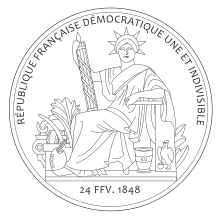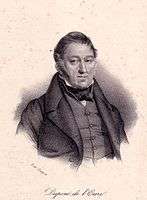Jacques Gervais, baron Subervie

Jacques Gervais, baron Subervie (1 September 1776, Lectoure, Gers – 10 March 1856) was a French general and politician.
Under Napoleon I
Subervie served as a French commander during the Napoleonic Wars, during which he mainly commanded cavalry troops. He commanded the 10th Chasseur Regiment in the Battle of Talavera in 1809. Subervie was made a général de brigade in 1811 and a général de division in early April 1814, a promotion which was annulled a couple of days later.
During the Hundred Days, Subervie was given the 5th cavalry division (1,487 men and 6 guns) in the I Cavalry Corps of General Pajol with which he served in the Battle of Ligny. Detached from his parent corps, Subervie's division accompanied the Army of the North and Napoléon to Waterloo. At Waterloo, after the emperor noted that the Prussians were marching to aid the Duke of Wellington, he was sent together with Lobau's VI Infantry Corps to hold the French right flank while the emperor faced Wellington. In this capacity he was involved in fighting the Prussians around Plancenoit.
He was laid off at the Bourbon Restoration and retired in 1825.
Later life
Elected in 1834, he was continually reelected until 1848, except between 1839 and 1842, and was part of the liberal opposition. For elections to the Constituent Assembly, he was elected as a Republican by the department of Eure-et-Loir and was reelected to the Legislature.
Subervie served as Inspector-General of cavalry in 1840. He served as the Provisional Government of the French Second Republic's Minister of War from February 25, 1848 to March 20, 1848. He resigned March 19, when he was appointed Chancellor of the Legion of Honor.
Subervie was a Grand Officier of the Légion d'honneur and held the title of Baron d’Empire during the Second French Empire.
After the coup of December 2, Subervie retired from public life and died in 1856.
| Political offices | ||
|---|---|---|
| Preceded by Marie Alphonse Bedeau |
Minister of War February 25, 1848 – March 20, 1848 |
Succeeded by Louis Eugène Cavaignac |

